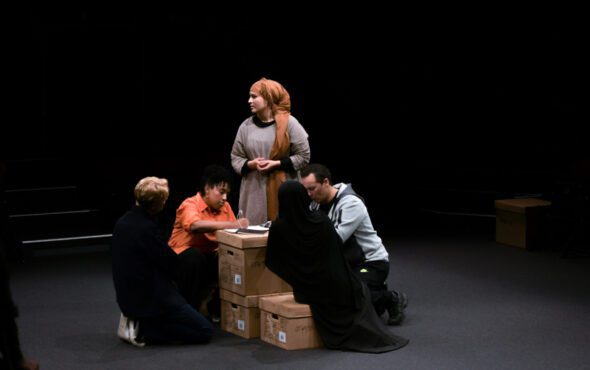
Before the show begins we’re aware that this is likely to be an extremely affecting piece of theatre – there are signs around the bar area of the Dorfman Theatre (the smallest of the three spaces in the National Theatre) advising audience members that there are safe spaces available upstairs in the theatre if they’re required during the evening. Before act one begins, the actors introduce themselves – out of character – to give us some context about the play, to reassure the audience that no fire will be shown at any time, and that we are free to leave the theatre whenever we wish if we feel we need to do so.
Grenfell: In the Words of Survivors tells the stories of nine survivors of the fire that broke out at the tower block back in June 2017, claiming 72 lives. Alongside their testimony – which is taken verbatim from interviews collected over the last few years – we also hear the views of the local Labour councillor as well as statements from representatives of the building management company and the developers tasked with the refurbishment of the tower block. These segments are taken from the Grenfell Tower Inquiry.
This is a play in two acts which unfolds chronologically: act one focuses on the residents living in the block and the events leading up to the tragic night, while act two considers how these nine residents made it through the night of 14th June and what happened in the immediate aftermath. There is a third part to the show, which comprises a short film featuring the survivors of the fire followed by a silent vigil and procession out of the theatre, led by the actors, for those who wish to pay their respects.
It’s a challenging viewing experience but one that’s powerful and poignant. It plays out like a documentary, one with a serious underlying message – discouraging the audience from simply being passive bystanders and calling us to unite and stand up for those affected by this tragedy. In the first act we witness what is essentially the managed decline of the estate – living conditions deteriorating, repairs done on the cheap or not at all, warning signs ignored, and a general attitude from the authorities that those in social housing should be thankful for what they’ve got and just deal with any issues.
We’ll all have read the headlines, but most of us don’t know these people or how this event impacted their lives. There are some haunting, chilling details shared, which can be quite uncomfortable to watch at times, but it’s incredibly powerful and moving. There are also some surprising moments of light relief – we see a hotel manager calling in to work apologising that he won’t make his shift, while another resident, running a bath to ensure she has water to combat the flames, worries about flooding the downstairs neighbour if she attempts to fight the fire herself.
Grenfell: In the Words of Survivors is an impressive, important piece of theatre. It challenges and provokes its audience in the way that all good art should; it’s an affecting play which will make people think about what happened long after they’ve left the auditorium. It raises valid questions that we should all be more vocal about – why, when the warning signs had been there for years, was this allowed to happen? And why, more than six years after this tragic night, has no one been held to account?
GAY TIMES gives Grenfell: In the Words of Survivors – 4/5
More information can be found here.



